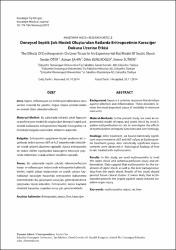Deneysel septik şok modeli oluşturulan ratlarda eritropoetinin karaciğer dokusu üzerine etkisi
Abstract
Sepsis, inflamasyon ve enfeksiyon tablolarına karşı
verilen sistemik bir yanıttır. Yoğun bakım ünitelerindeki
en önemli ölüm sebeplerindendir.
Materyal-Methot: Bu çalışmada ratlarda çekal ligasyon
ve perforasyon modeli ile oluşturulan deneysel septik şok
modeli kullanarak eritropoetinin hepatik fonksiyonlar ve
histolojik bulguları üzerindeki etkilerini araştırdık.
Bulgular: Eritropoetin uygulanan tedavi grubuna ait sıçanlarda tedavi sonrası AST ve ALT değerlerinde istatistiksel
olarak anlamlı düzelme saptadık. Ayrıca eritropoietin
ile tedavi edilen sıçanlardan karaciğerin histolojik yapısında istatistiksel olarak anlamlı düzelme saptadık.
Sonuç: Bu çalışmada septik şoktaki iskemi-perfüzyon
hasarı ve inflamasyon tedavisinde eritropoetin kullandık.
Veriler, septik şokun tedavisinde ve septik şoktan kaynaklanan
karaciğer hasarında eritropoetin kullanımını
önermektedir. Bu çalışmanın sonuçları, gelecekteki klinik
çalışmaları teşvik edecektir. Eritropoetin, sepsis kaynaklı
oksidatif hasardan organları korur gibi görünmektedir. Background: Sepsis is a systemic response that develops
against infection and inflammation. These disorders remain
the most important cause of mortality in intensive
care units.
Materal-Methods: In the present study, we used an experimental
model of sepsis and septic shock by cecal ligation
and perforation in rats to investigate the effects
of erythropoetin on hepatic functions and liver histology.
Findings: After treatment, we found statistically significant
improvement in AST and ALT values at Erythropoietin
treatment group. Also statistically significant improvements
were observed in histological findings of liver
in rats treated with erythropoetin.
Results: In this study, we used erythropoietin to treat
the septic shock and ischemia-perfusion injury and inflammation.
Data suggest that erythropoetin for the treatment
of septic shock, as well as the liver damage resulting
from the septic shock. Results of this study should
prompt future clinical studies. It seems likely that erythropoetin
protects the organs against sepsis-induced oxidative
organ injury.
Source
Afyon Kocatepe Üniversitesi, Kocatepe Tıp DergisiVolume
16Issue
3Collections
- Kocatepe Tıp Dergisi [154]



















